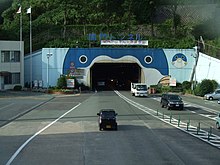Kanmon Tunnel
| Overview | |
|---|---|
| Line | San'yō Main Line |
| Location | Honshu-Kyushu |
| Operation | |
| Opened | 1942 |
| Operator | JR Kyushu |
| Character | Passenger and freight |
| Technical | |
| Line length | 3,604 m (11,824 ft)/ 3,614 m (11,857 ft) |
 |
|
| Overview | |
|---|---|
| Line | National Route 2 |
| Location | Honshu-Kyushu |
| Operation | |
| Opened | 1958 |
| Technical | |
| Line length | 3,461 m (11,355 ft) |
| Lowest elevation | 58 m below sea level |
| Overview | |
|---|---|
| Line | Sanyō Shinkansen |
| Location | Honshu-Kyushu |
| Operation | |
| Opened | 1975 |
| Operator | JR West |
| Character | Passenger |
| Technical | |
| Line length | 18.713 km (11.628 mi) |
| Track gauge | 1,435 mm (4 ft 8 1⁄2 in) |
The Kanmon Railway Tunnel, Kanmon Roadway Tunnel, and Shin-Kanmon Tunnel are undersea tunnels crossing the Kanmon Straits between Shimonoseki, Yamaguchi, and Kitakyushu, Fukuoka in western Japan. When opened in 1942, the railway tunnel provided the first direct link between Honshu and Kyushu, two of Japan's four main islands.
The Kanmon Railway Tunnel (関門鉄道トンネル kanmon tetsudō tonneru?) was the first undersea tunnel in Japan. It goes underneath the Kanmon Straits, connecting the islands of Honshu and Kyushu. It is an important link in the Japanese rail network. Its construction began in 1936, and it was completed in November 1942, during the Pacific War. The Honshu-bound tunnel is 3,604 m (11,824 ft) long, the Kyushu-bound tunnel is 3,614 m (11,857 ft). Track gauge is 1.067 m (3 ft 6.0 in), and its electric power supply is at 1,500 volts DC.
Near the end of the Pacific War the Allies planned to blow up the two tunnels with 50,000 pounds of explosives as part of the invasion of Japan. 250 Office of Strategic Services agents trained for the task, but the surrender of Japan occurred before they were needed.
The Kyushu Railway Company (JR Kyushu) assumed ownership of this tunnel following the breakup of the Japanese National Railways system in 1987.
...
Wikipedia
